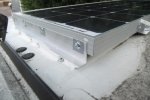Firefox
Full Member
- Posts
- 4,422
- Likes
- 109
I am not dishing solar, and in an ideal world we would all live off it.
But here's my 2 penneth. I have 2 110a/h led lighting, no TV, 1000w inverter for laptops and iPads and phone charging.
I once left my 12v fridge on and in the morning we had flat batteries. I started the engine for 20 minutes and I did another 4 days without moving (festival).
So in conclusion 20 mins of tick over charging will cost next to nothing and if done at the right time will not upset anyone nearby, and believe me at a festival they pack us in.
Alternator on tick over will probably give about 10-15 amps once the the initial high charging current settles after a minute or so. But be on the generous side and say 20 A.
20 amps at 14 V for 1/2 an hour = 20x14x0.5 = 140Wh
Although it's a useful top up charge, and may last a good while if your usage was low, it wont give you the charge an 80W solar panel will give in a day (350 Wh ?)
Another thing to consider, is if your solar panel keeps your leisure battery topped up, when you drive off normally, it wont draw a big current from the alternator which means the alternator belt wont drag on the engine so much and you'll get increased mpg. This is kind of a hidden benefit as it seems on the surface you get a "free" recharge every time you drive, but you will pay for it for a while by slightly poorer mpg especially if your leisure battery was very flat.
I'd agree though it will take some time to recover your solar installation cost in diesel costs! Even for full time use it may take a couple of years, longer if you only use your van some of the year.
Last edited by a moderator:





